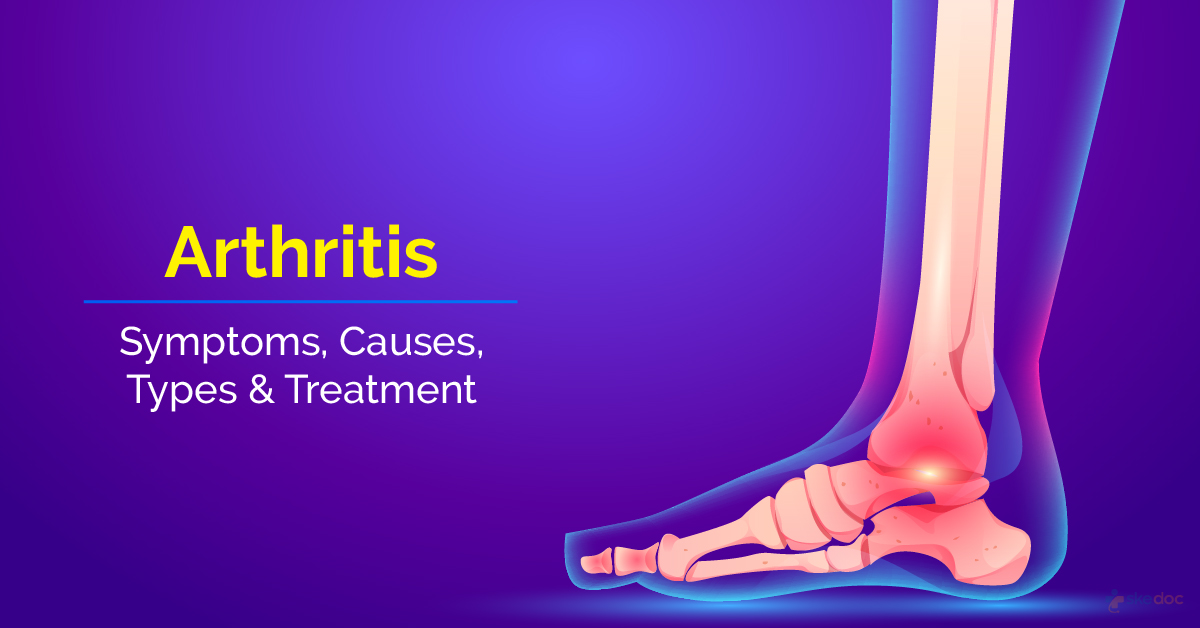Allergy
Blood Diseases
Bone & Joints
Brain
Cancer
Child Care
Cosmetic Surgery
Diabetes
Endocrinology
ENT
Eye
Gen Medicine
General Surgery
Heart
Kidney
Lifestyle
Liver & Digestive
Lung
Men’s Health
Mental health
Physiotherapy
Rheumatology
Skin and hair
Sleep Disorders
Spine
Transplant
Women Health
Thyroid
Vascular Surgery
Arthritis: Symptoms, Causes, Types & Treatment

What is Arthritis?
Arthritis is a broad term referring to a condition affecting the joints of the body that leads to damage and loss of function. This condition may be the primary problem in some instances, or it may be a part of or a symptom of another disease. It may develop suddenly or over a long period. The different types of arthritis affect many people worldwide and are one of the main causes of poor quality of life.
Is Arthritis a Medical Emergency?
Arthritis is not a medical emergency.
Types
There are several types of Arthritis, and the more common symptoms among these are:
- Osteoarthritis: A condition in which the cartilage in the joints that act as cushions is damaged
- Rheumatoid Arthritis: This is an autoimmune disease that mainly affects the joints
- Gout and Pseudogout: This is joint inflammation and damage due to the deposit of uric acid crystals
- Septic Arthritis: A condition of infection of the joints
- Ankylosing Spondylitis: An inflammatory condition that affects the spine
- Juvenile Idiopathic Arthritis: Inflammation of the joints that is seen affecting individuals in the pediatric age group
- Stills Disease: A systemic form of an inflammatory condition affecting individuals in the pediatric age group
The diseases in which Arthritis is a major symptom are:
- Psoriasis (Psoriatic Arthritis)
- Reactive Arthritis
- SLE (Lupus Arthritis)
- Hepatitis
- Hashimoto's thyroiditis
- Sarcoidosis
- Whipple's disease
- Hemochromatosis
- Celiac disease
Causes
The underlying mechanism is the presence of inflammation and the destruction of the cartilage that works as a cushion for the joint and subsequent damage to the bone. The development of Arthritis may be caused by:
- Trauma
- Overuse, or regular wear and tear of the joints
- Immune system mediated joint destruction
- Infections
- Deposit of uric acid crystals
Risk Factors
The risk factors include:
- Age: The risk increases with age, although children can also be affected by it
- Gender: Women are more prone to Arthritis than men
- Family history: A family history of Arthritis increases the risk of developing due to a genetic predisposition
- Trauma: A history of a joint injury increases the risk of developing Arthritis in that particular joint
- Obesity: Excessive stress, especially on the weight-bearing joints, increases the risk of developing Arthritis
- Systemic diseases: Conditions like heart disease and diabetes increase the risk of Arthritis
Triggering Factors
While Arthritis itself may develop either suddenly or over some time, certain factors can result in a sudden flare-up of the condition, and these include:
- Stopping or tapering Arthritis medication
- Overexertion
- Stress
- Lack of sleep
- Infection
- Cold weather
- Repetitive motion
- Weight gain
- Consumption of certain foods
- Dehydration
Signs & Symptoms
The most common symptom is the presence of pain, which may vary in severity and the gradual limitation of the function of the joint.
The symptoms and signs include:
- Pain
- Stiffness
- Swelling
- Warmth and redness
- Decreased range of motion
- Muscle aches and pains
- Weakness and fatigue
Investigations
The investigations that are done to establish a diagnosis include:
- Laboratory tests:
- Blood tests
- Urine tests
- Joint fluid analysis
- Imaging tests:
- X-rays: To assess the extent of cartilage and bone damage and to track the progression of the disease
- CT scan: To determine the extent of cartilage and bone damage and to track the progression of the disease
- MRI: To assess the extent of damage to the soft tissues such as cartilage, ligaments, and tendons
- Ultrasound: To evaluate the soft tissues such as cartilage, study the joint space, and provide guidance for joint fluid aspiration
- Arthroscopy: A minimally invasive procedure that is done to visualize the inside of the joint using fibre optics
Diagnosis
The diagnosis is established based on medical history, clinical evaluation, and the results of the investigations.
Course & Stages
It is usually a slowly progressing disease, though it may sometimes develop suddenly. Previously diagnosed conditions sometimes increase the severity of symptoms, called flare-ups, which certain factors or activities may trigger.
Treatment Options
The management is aimed at relieving pain symptoms, halting or slowing the condition's progress, and increasing mobility and range of motion.
Medical management
Medical management depends on the type of Arthritis and may include:
- Analgesics: To relieve pain
- NSAIDs: To reduce inflammation
- Disease-modifying antirheumatic drugs (DMARDs): To slow the progress of disease and inflammation in Rheumatoid Arthritis
- Biologic response modifiers: Such as TNF inhibitors and Interleukin inhibitors, reduce inflammation and slow the progress of the disease
- Corticosteroids: To reduce inflammation
Injection therapy for osteoarthritis knee
- Vesicospplementation therapy, like an injection of sodium Hyluranate gel
- PRP -Platelet Rich Plasma therapy
- Stem cell therapy
- Intra articular steroid injection
Interventional including surgery and indications for surgery
Surgical intervention may be required in advanced cases, where conservative management has not provided relief or when the damage to the joint and disability is extensive. Surgical interventions may include:
- Joint replacement arthroplasty: A part or whole of the joint is replaced with a prosthetic device to restore the function of the joint along with mobility
- Joint repair or Resurfacing arthroplasty: The affected joint is resurfaced or re-positioned to reduce pain and increase mobility
- Joint fusion: The surfaces of the joint are fused into one. This is usually done for small bones, such as in the wrist, fingers, or the spine.
Role of Diet/ Exercise/ Lifestyle Changes/ Preventive Measures
Physical therapy may help to increase mobility, and lifestyle changes may help to halt the progress of Arthritis. Some of the measures that can be taken include:
- Maintaining ideal body weight: Losing weight and maintaining a perfect body weight helps to reduce excessive stress on the weight-bearing joints
- Exercise: To keep the joints flexible and maintain mobility
- Avoiding overexertion and very strenuous activity
- Avoiding extreme cold weather
- Avoiding certain foods that can trigger flare-ups
- Getting proper rest and sleep
- Using mechanical aids to provide support and reduce strain on the joints
Complications
Arthritis can lead to severe disability and poor quality of life. Some of the complications include:
- Total loss of joint function, movement, and mobility
- Formation of deformities of the bones
Prognosis
The prognosis depends on the type of Arthritis, but most people lead a poor quality of life if good medical attention is not received.
When to contact the doctor or hospital? / How to identify the emergency or complications?
It is advisable to seek medical attention and advice when the symptoms are first noticed, as early diagnosis and treatment can help slow the disease's progress.
Indications for hospitalization if required
Hospitalization may be needed when surgical intervention is required to treat the condition.
Suggested clinical specialists/ Departments to consult for this condition
It can be attended to by rheumatologists, orthopaedic surgeons, and physiotherapists.
Was this article helpful?
YesNo
Comments





